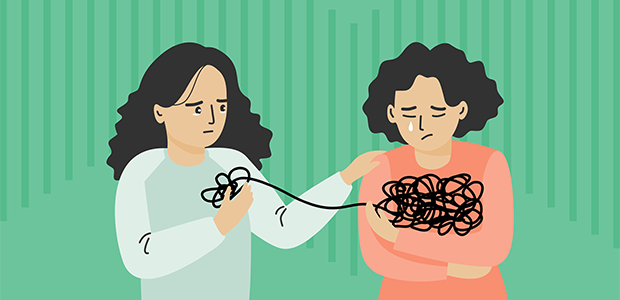
Recovering from burnout taught me the strength in asking for help
It started with severe insomnia. At my worst, I was only getting two hours of continuous sleep a night, and that’s on the good days. This went on for 18 months. 18 months of broken nights, waking up more exhausted than I’d gone to bed, and trying to navigate my life through a fog of fatigue so intense, I sometimes couldn’t even remember what day it was.
The consequences were more than physical. Mentally and emotionally, I was struggling. There were mornings when I couldn't open my laptop. Even feeding my two girls felt like too much. My husband had to step in just so we could make it through the day in one piece.
This wasn’t just “feeling tired.” This was burnout, the kind that slowly builds until it knocks you over completely. And I didn’t see it coming.
As a founder, I’d gotten used to running on adrenaline and ambition. Late nights and packed calendars were part of the job description, or so I thought. But there’s a difference between working hard and running yourself into the ground. I had crossed that line and kept going for far too long.
There was no instant fix
I wish I could say there was a miracle solution, a supplement or a strategy that turned it all around. But recovery didn’t come from a single breakthrough. It came from a series of small, deliberate choices.
I tried the usual options, prescriptions, herbal remedies, and even sleep hygiene practices that sound great in theory but did little in the throes of real insomnia. But nothing stuck until I started with something even more basic, being honest.
I began talking. I opened up to my family, to my closest friends, and eventually, to my team at work. I shared how deep the exhaustion ran, how I wasn’t coping, and how I needed help. Not in a performative, “I’m struggling but still delivering” way. In a real, vulnerable, “I can’t do this at the moment” way.
That honesty, while terrifying, was the beginning of healing from burnout.
Asking for help was my turning point
Letting people in didn’t solve everything, but it shifted the weight. I asked friends to take the girls for a few hours. I gave myself permission to sign off at 3pm. I let the team make decisions without me. For someone used to being the fixer, the leader, the 'I’ve got this' person, it felt like weakness. But looking back now, I realise it was actually a strength.
One of the hardest parts of burnout is the guilt. I felt guilty for needing help. Guilty for not having the energy to play with my girls. Guilt is a quiet voice that tells you you’re failing even when you’re just trying to survive.
But acknowledging that guilt and facing it, was a powerful step. It helped me separate the emotion from the facts. The truth was, I wasn’t a bad mum or a bad founder. I was a human who had pushed past her limits for too long.
What recovery looks like now
Today, I sleep. Not always perfectly, but consistently. I take breaks without justifying them. I set boundaries that would’ve felt selfish a few years ago. Most importantly, I listen to my body.
I also share my story, because I know how many others are burning out in silence. Founders, especially women, are often praised for being “superhuman”, juggling startups, families, teams, and expectations. But we’re not built to do everything, all at once, without rest.
My message to anyone nearing burnout is simple: pause. Breathe. And ask for help sooner than you think you need it. You don’t need to crash to make a change.
Recovery isn’t linear, and it isn’t easy. But it is possible, and it starts by giving yourself permission to stop pretending you’re fine.
For more startup news, check out the other articles on the website, and subscribe to the magazine for free. Listen to The Cereal Entrepreneur podcast for more interviews with entrepreneurs and big-hitters in the startup ecosystem.

